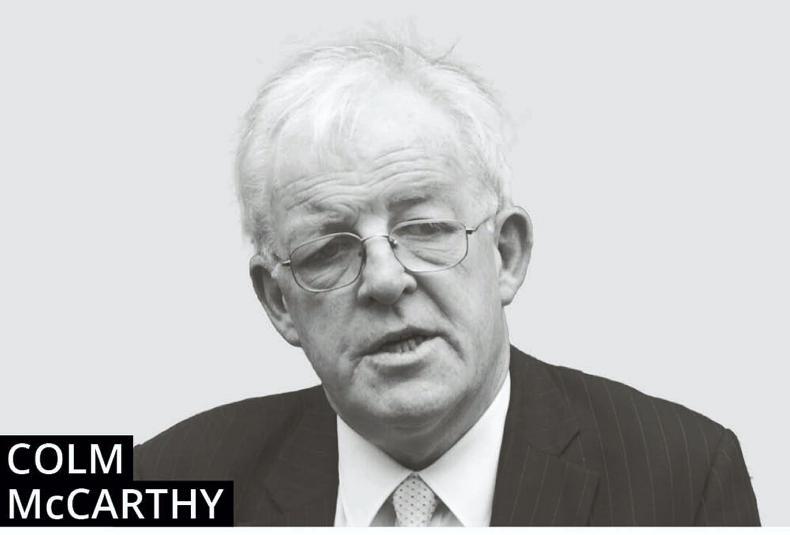Ireland abolished its independent currency in January 1999, as did 10 other members of the European Union, forming the eurozone common currency area.
There are now 19 members and they share a single central bank in Frankfurt.
Each retains a national institution called, for example, the Banca d’Italia or the Banque de France, but these are not central banks in the sense that they exercise sovereign control over monetary policy. They do not control interest rates or the country’s exchange rate.
Fluctuations in the external value of the currency, if you have one, translate world price trends for imported commodities into domestic inflation rates, and are entirely beyond the control of these institutions, which perforce operate as local offices of the European Central Bank.
It follows that the national governments of eurozone members do not enjoy decisive control over the rate of inflation. For the common currency area as a whole, the policies pursued by the ECB in Frankfurt are what matters, and it has been ECB policy since the eurozone’s inception to target an inflation rate of 2%. In this, it has been largely successful, on average.
Recently, inflation across the eurozone has been 5% or a little more in most member countries
There were periods of overshoot prior to the financial crash of 2008 followed by periods of undershoot and year-by-year inflation rates in member countries can diverge from the euro-average – in Ireland, they were higher during the bubble period and lower after the crash.
Recently, inflation across the eurozone has been 5% or a little more in most member countries and the ECB has been at pains to stress that its long-run target remains intact at 2%. There is no reason to doubt that it will tighten monetary policy in due course in order to deliver on this mandate. That will mean higher interest rates and borrowing costs.
It also means that inflation in Ireland will return to the 2% region without any action by the Irish authorities.
Calls from opposition politicians for the Government to ameliorate the impact of the recent price surge on vulnerable groups are a different matter
Short of departing the eurozone, there are no actions available to attain a long-run inflation rate much different to the common currency norm, which will be determined in Frankfurt and not in Dublin.
Calls from opposition politicians for the Government to ameliorate the impact of the recent price surge on vulnerable groups are a different matter – it is always open to governments to rearrange the distribution of real income across society through changes to tax and expenditure policies.
To the extent that the surge has been due mainly to the cost of imports, there is nothing that can be done to compensate the public at large. No trading economy can offset an adverse movement in the terms of trade, through pretending that import price increases have not occurred.
All that can be done is to redistribute the pain, with balanced subsidies and tax increases, or to borrow more, the option which has been chosen.
The Government’s headline measure is to be an across-the-board €200 credit on electricity bills, along with selective improvements to some social transfers.
Neither food prices nor rents have yet contributed significantly to the increase in consumer price inflation
The electricity credit has two merits: it is once-off, as the inflation spike is expected to be, and it targets a major component, namely energy bills. Another component, a cut of 20% in bus and train fares, is harder to understand and will be difficult to unwind. Public transport fares have not contributed to the inflation spike at all.
Neither food prices nor rents have yet contributed significantly to the increase in consumer price inflation, but both may be set to do so. The food industry has faced supply chain problems, including Brexit-related headaches and labour shortages, as well as energy costs. They could be passed through in the coming months.
While the property websites are reporting sharp increases in the rents demanded on a dwindling supply of available properties, this will take time to show up in recurring rental costs for existing tenants.
Rising demand
Unlike oil and gas prices, which are outside the Irish Government’s control, the supply side of the housing market suffers from dysfunctional policies, especially in the planning system.
It has become far too difficult for developers to meet rising demand in urban Ireland and politicians of all parties seem to be paralysed by the obstructionism of residents’ associations, facilitated by the courts.
There have already been calls from unions for further public pay increases
For any eurozone country, the response to the inflation spike needs to be realistic. A bad option would be extra borrowing to pay for concessions likely, for political reasons, to prove permanent. There have already been calls from unions for further public pay increases and from opposition parties for reductions in indirect taxes.
The process of dampening the surge in inflation across the eurozone has already been spelled out by the ECB. Interest rates have already crept up in wholesale money markets and government bond yields are rising. Not a good time to incur more debt.










SHARING OPTIONS